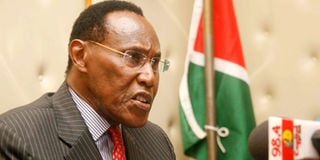Kenya 'ready' for post-referendum Sudan

Acting Foreign Affairs minister George Saitoti addresses a Press conference January 5, 2010 at the ministry headquarters on the impending Southern Sudan referendum. TOM MARUKO | NATION
The Kenyan government and the United Nations High Commission for Refugees on Wednesday said arrangements are in place to host refugees in case war breaks out in Southern Sudan after Sunday’s referendum.
The plans include intensifying security along the common border of the two countries and the registration and documentation of refugees who are likely to flock the country.
“Proper mechanisms have been put in place to ensure that the government is not caught off-guard in case differences emerge in south Sudan after the referendum that might result in influx of refugees into the country,” said Patrick Muriira, Turkana West District Commissioner.
“We are consulting with members of the local community to provide extra land to accommodate more refugees in case there is an influx after the southern Sudan referendum,” disclosed Mr Muriira.
He said according to a study carried out by the government and UNCHR, about 20,000 refugees from Southern Sudan are likely to enter Kenya between January and February this year.
A further 80,000 would troop into Kenya by the end if the year if the upheaval was to continue, bringing the number to 100,000, said Mr Muriira.
In Nairobi, acting Foreign Affairs minister Prof George Saitoti was quick to point out that all indications are that the referendum will be peaceful.
He said the Kenyan government would also respect the wishes of the Sudanese people, who will decide on whether to establish an independent state in the vote starting Sunday.
“In the unlikely event there are difficulties there, people have to come to Kenya, and arrangements are in place,” said Prof Saitoti.
“There is both humanitarian and logistical support,” said Prof Saitoti, who was reluctant to elaborate on the arrangements he spoke of.
Prof Saitoti urged the leaders of both the Sudan People’s Liberation Movement from the south and the National Congress Party of the north to preach messages of peace and restraint in the run-up to the referendum.
Decisive vote
Prime Minister Raila Odinga also called on the people of Southern Sudan to deliver a decisive vote that would leave no room for doubts and disputes.
Mr Odinga sent Lands Minister James Orengo to deliver his message to President Salva Kiir Mayardit of Southern Sudan in Juba.
The PM said Kenya is prepared to take and live with the results of the referendum but is keen on “a decisive vote.” He said Kenya will support “the will of the people of South Sudan.
In Nairobi, Prof Saitoti said the Government is encouraged by recent statements by both President Omar al-Bashir and First Vice President Salva Kiir, which are likely to contribute to a peaceful plebiscite.
Kenya also wants the people and leaders of Sudan to look beyond the referendum and at weighty issues that are yet to be considered, and which have to be dealt with before July 2011.
Among these are; the unresolved Abyei referendum, the demarcation of the border between the south and the north, consultations in Southern Kordofan and the Blue Nile states as well as agreement on post-referendum agreements.
Prof Saitoti also praised the remarks made by Sudan’s President Omar al-Bashir on his visit to Juba, the southern capital, on Tuesday.
President Bashir told southerners he would accept the results of Sunday’s referendum even if the South’s four million voters decide to secede and form Africa’s newest state.
“I personally will be sad if Sudan splits. But at the same time I will be happy if we have peace in Sudan between the two sides,” President Bashir said in a speech to senior Southern Sudan officials.
“I am going to celebrate your decision, even if your decision is secession,” he added.
Kenya’s interests in Southern Sudan are vast, and the country has committed more than $6.4 million (Sh512 million) in support there from January 2005 to June 2011.
More than $3.5 million has been used in development and training of the civil service for the semi-autonomous region under a Technical Assistance Agreement with Kenya.
Prof Saitoti said an additional $2.8 million has been allocated to support the programme in the 2010/2011 financial year up to June this year.
Kenya also hosted a large number of refugees from Sudan at Kakuma as war raged between the then Sudan People’s Liberation Army rebels and the government forces before the Comprehensive Peace Agreement.
Kakuma refugee camp is home to a total of 72,000 refugees, 15,000 southern Sudan nationals, 40,000 Somalis while the rest are from Ethiopia, Rwanda, Burundi among other countries.
It has one polling station where 5,000 are expected to participate in Sunday’s referendum on independence.
Kenya was also one of the key organisers of a summit of the regional Inter-Governmental Authority on Develeopment (IGAD) to ensure both the north and the south stayed the course of the CPA.
The recent revelations by whistle-blowing website Wikileaks of United States embassy cables showed Kenya had imported and sent 32 Russian-made tanks to Southern Sudan.
Prof Saitoti skirted around the matter despite repeated questions by journalists, either choosing to ignore the questions altogether or giving unrelated answers.
The SPLM has been firm in its resolve to break away and form Africa’s newest state and while the East African states appear to support that idea, they have elected to be diplomatic and await the results of the referendum.




